Meet Guido Fiorentino, Fifth-Generation Owner of the Grand Hotel Excelsior Vittoria in Sorrento
Issue #99
Set on a promontory overlooking the port of Sorrento, the Grand Hotel Excelsior Vittoria was just voted the best resort in Italy in Travel + Leisure’s World’s Best Awards—and it’s easy to see why. As soon as you enter the property, you immediately feel like you’re being whisked back in time to an era when ladies wore gloves and a pianist serenaded guests during cocktail hour. A member of the Leading Hotels of the World, it’s one of Italy’s finest family-run grand dames, worth visiting even if it’s just for an aperitivo on the terrace overlooking the Bay of Sorrento, with Vesuvio in the distance, or a romantic dinner at the Michelin-starred Terrazza Bosquet.
I was there in April to celebrate the hotel’s 190th anniversary and had a chance to interview Guido Fiorentino, the hotel’s fifth generation owner, who I’ve gotten to know over the years thanks to press trips and events for Leading Hotels of the World. We discussed his earliest memories of the hotel, the way it has evolved since he took the helm, why the hotel’s classic style will never change, and where he likes to spend his free time around Sorrento. I’m thrilled to share our chat as part of my series of interviews with entrepreneurs and creatives in Italy.
What are your earliest memories from the hotel?
Basically, I grew up here. And so for me it was a holiday place because as a kid, I had a lot of cousins and we were running everywhere in the garden. We were not allowed to go inside the hotel. We were only allowed to be outside in the garden, not the pool. And then after five o'clock we could not be around, but it was really fun because it was summertime.
At the time I was living with my parents in Napoli and coming here for weekends and for summer holidays. When you are small, I think you see everything as much bigger than it is in reality. So for me it was a kind of paradise where I could go with a bicycle, I could do all kinds of stuff we could not do in Napoli. Sometimes people ask me if at that time I was thinking maybe one day of taking it over. I never did.
That was my next question.
I was anticipating that. I never thought that I would take over the hotel. In high school, my father was not encouraging me and my brothers to follow the family business. He was always telling us, “Do whatever you want to do.” So I started to work in a hotel, but in Napoli because at that time, we owned the Hotel Vesuvio. And I worked for a few months in the Hotel Vesuvio at the purchase office.
And then I decided not to work there and I switched to a different job in the leather business—leather for shoes, for garments, for handbags—so I was selling the raw material to Italian families to produce the leather for shoes. And then I ended up involved with the hotel business in 2000. In 2000, I joined the board of this company. And then three years after, I became CEO and then when my father died, I became president and CEO of the company. So I never worked in the hotel before becoming CEO of the hotel.
How has the hotel changed in the time that you've been in charge here?
I think it changed a lot. Consider that when I started, the hotel had about 110 rooms and now we have 80 rooms. So I lost about 20 rooms, making rooms larger and upgrading the offer. So now we have about 60% of our room stock that is suites and the rest are double rooms. Plus, I opened two new restaurants. One, the Terrazza Bosquet, has a Michelin star since 2014. We opened the Terrazza Vittoria restaurant, L’Orangerie at the pool area, then we opened the lounge by the pool and bar à champagne.
Have you seen more locals or people from Naples who are coming to the restaurants to eat?
Yes, let's say there was an issue to solve when I started because we did have a restaurant, but at night the restaurant was almost empty. Why? Because we are right in the center of Sorrento, it’s very easy to walk out and find as many restaurants as you want: pizza, Michelin star restaurants, trattoria, practically everything. So I was thinking: What do I have to do? Invest in the right food and beverage and try to attract more people or maybe be drastic and say “Okay, I close my restaurant at night.” And I decided to invest.
In Italy, it’s not that common that people go to eat in hotels because usually they think that in hotels, the restaurants are not good. So this was the first barrier. And then I decided the way that we can convince people to eat in the restaurant is to try to get a Michelin Star because that is an external company that certifies that we are doing something properly. So I made this investment to try to get a Michelin star, so I changed everything. I changed the chef, I changed the team. I opened a new restaurant in a different way. I worked on it for about one year and then we opened it in 2014. So we opened with that in mind. Our goal was to get a Michelin star, and we did it.
So that changed a lot because as soon as we got the Michelin star, we saw this shift with people coming to try the restaurant from the outside. That also gave me the trust to continue to invest in that. So now we can see that about 55% of our guests in our restaurants are external. And also our breakfast is becoming very popular and we are getting reservations from people not staying with us to have breakfast.
Oh that's interesting.
This is another shift because if you go to New York it’s easy. You invite somebody to meet you for breakfast. Here it’s very unusual. So first they went to the terrace, but now as soon as they understand how big is the offer of our breakfast—even if it’s expensive because sometimes the breakfast is more or less like a lunch—they eat a lot so they love it. And this is another reason I continue to invest in food and beverage. That's why this year I opened the Bar à Champagne right in the square. That is at the entrance of the hotel that has a window on the square.
How have you seen Sorrento change over the years?
I have to say I'm not happy about how it’s changed because for me they have to try to be more selective and reduce the quantity of people. But this is a problem not only for Sorrento, of course. We have everywhere in the world this overtourism, whatever you want to call it, that is not because of the hotels. The number of rooms is still the same, but it's because there are a lot more offers to sleep in one place. And so there are more people, but many of these places are not prepared.
Like the Airbnbs?
Airbnb, case vacanze... There are a lot, so you see more people.
So how would you tell people to avoid the crowds in Sorrento?
Of course you can come off season. It's crowded, but not that much. The weather is usually nice and of course the sea is cold, but it is very nice. September is good. At the hotel, we already work very well in September. October is very good. Then also the city is more authentic, because of course there are less international tourists around, so you find more local people than tourists.
And then the hotel closes...?
We close the eighth of January. Usually we open the first of April and then we close the eighth of January. Christmas and New Year’s are fantastic for us. New Year’s is a kind of second high season because Sorrento is dressed up with all these markets for Christmas, nice lights. Everything is very nice. And also the hotel. We spend about one month decorating all the gardens and the hotel. They are all dressed up for Christmas.
So you have a longer season than a lot of the hotels on the Amalfi Coast. They usually close at the end of October, no?
They usually close at the end of October and open at the beginning of April, around Easter. So it is a longer season because Sorrento is a living town, so people live in Sorrento all year long. Schools are in Sorrento, restaurants, museums, and they’re all open. That's why in the off-season you can do everything. Maybe you can’t swim or you can’t go out with a boat, but you can do all the things you do in summer.
Do you find that there are different kinds of guests that come in the summer versus the off season?
Mainly the ones that come in the high season in summer are families so they can come during the children's holiday. Maybe the off-season is more cultural. Then maybe in summer they go out more with boats and they have a different way to enjoy the place.
You must get a lot of repeat guests too, no?
Yes, there are a lot of repeat guests. We have some of them for 50 years coming back every year, same time, same room. But also what is very, very nice is that some of them became friends with other clients, maybe Americans with some clients from Germany, some others from Australia. They organize their holiday together every year so they can meet here. And they tend to always do the same things. So they know for example there is one restaurant they like. They always go to that restaurant and then maybe because they went on Monday, they always go on Monday. That’s always funny to see. Also I think as a family hotel, where the family is present as we are, it’s very nice that we develop friendships with our guests.
So this is the nice part of the hotel. We like to meet people, to talk to them, to develop this relationship. This of course keeps them coming back. Now we have also a lot of new clients that are becoming repeat clients. So we have people coming here for their honeymoon and then the kids come back. Maybe they are not coming back every year, but they're coming back. So this is something that we developed.
How do you keep the hotel relevant for the next generations? I mean, there's so much history, but it can't be set in stone, right? It has to evolve in some way.
I think we are very classic. And I’m very glad to tell you that when I started, I was a little bit scared because the average age of our clients was 65 plus and I thought, “I don't want this type of hotel.” So I did the work to attract younger people and then I discovered that also young people coming here, for example young couples from the States, love to come here because the hotel is like this.
So yes, we have to modernize, to make sure the WiFi is working, put in plugs to charge the phones, we put in pipes so you can have one room cold, one room heated, the pool is heated. All these modern things you have to do. But I don't think that we have to change the style of the hotel and I think also for the future that we have to keep it as it is and try to be more modern.
So when Luca joined, we introduced the digital directory for example, but I am against all of the home automation because I don't think that the client that maybe spends two nights has to learn how to switch off the light. It’s better to keep it simple.
Do you feel that it's still very important to keep family owned hotels independent?
Yes, I think for us, we need a company like Leading Hotels of the World in order to be present all over the world. It’s a company that is not only good for sales and marketing, because of course they have offices that organize meetings with talent agencies, they attend the trade shows and we can join them. But now we're also doing a lot of training.
With Leading we are making an agreement with big international players, so independent hotels can access the services at a better price, for example. Leading also does quality assurance, so they can train the staff and check the quality of the hotel. This is very important because otherwise as a single hotel, you cannot afford to do everything by yourself. And so I still think that Leading is important for small and independent hotels. And of course they are focused on independent hotels.
I’ll wrap it up, but I was just curious if you would be willing to share a few of your favorite places in Sorrento or on this coast?
First of all, I like to go out with a boat. So if I have free time, I go out with a boat. There’s a bay that I like very much, Ieranto Bay, it's a marine park. So now you can go there only if you get permission to access the park. And it's a place that’s special because until I was maybe 26 years old, it was open. It wasn't the park. So we used to go there with friends and enjoy the place. So that is something that I like very much on the boat. It’s on the coast near Punta Campanella. Now it belongs to FAI, the Fondo Ambiente Italiano.
Do you swim there?
Yeah, we organize snorkeling there for our clients. That is very nice. As for restaurants, I like Maria Grazia, but it's difficult to go because it's always very crowded, so we go in the off-season, in December. Sometimes we will take some people there. When we go as a family, we know each other very well, so we call them and say “When can we come?”
In Sorrento, I like the Museo Correale, which is celebrating 100 years. That's a good museum in Sorrento. And the museum for inlaid wood. That one is very nice.
Further Reading
Be sure to check out my review of the Grand Hotel Excelsior Vittoria for Travel + Leisure.
I also profiled the hotel for Italy Magazine’s ‘Inspired Stays’ series.
Planning a trip to the area? You might want to consult my guide to 72 Hours on the Amalfi Coast.
You can see all the interviews in this series here.


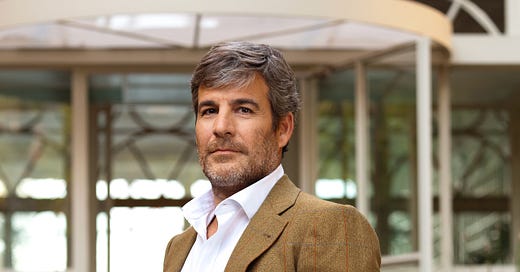



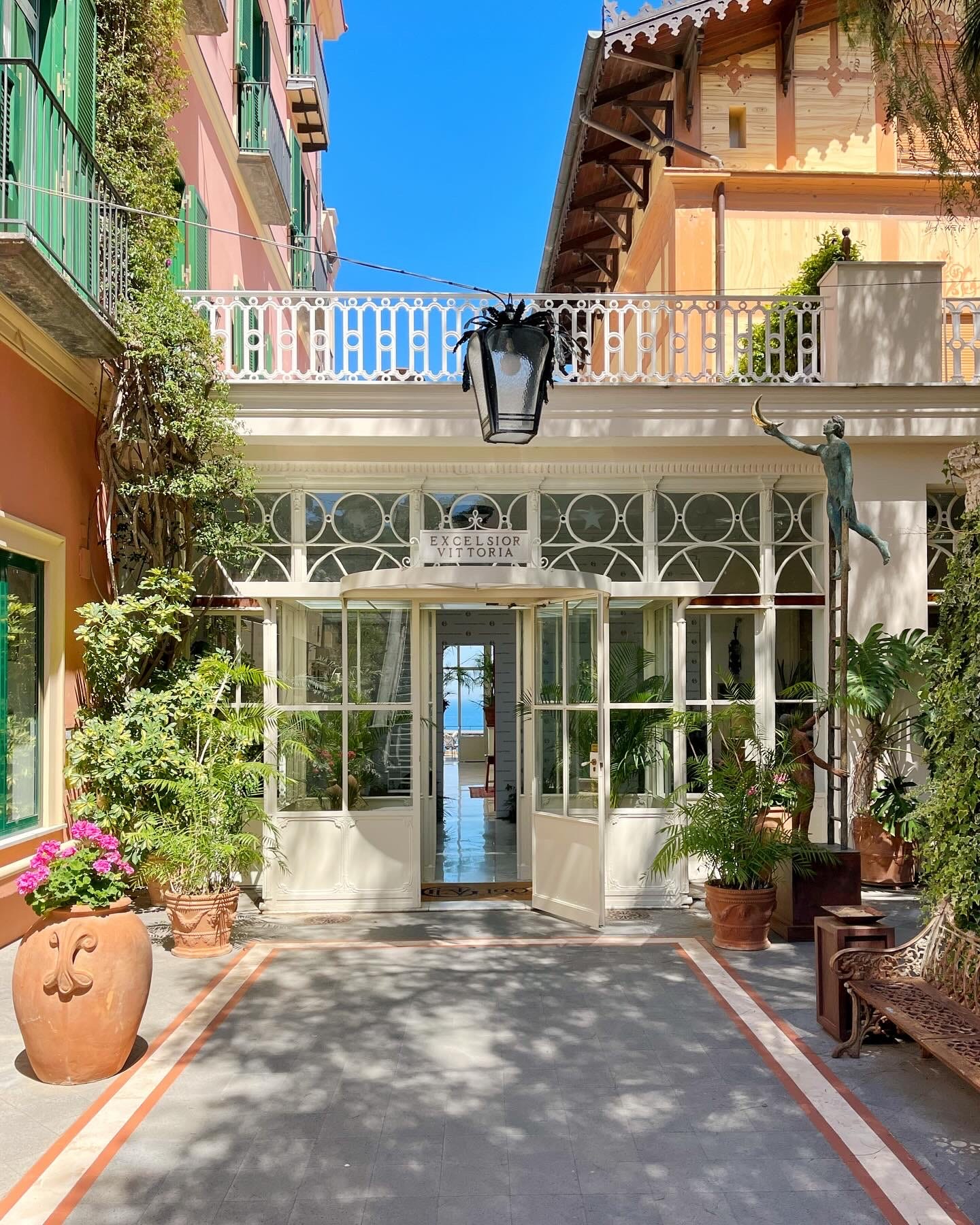
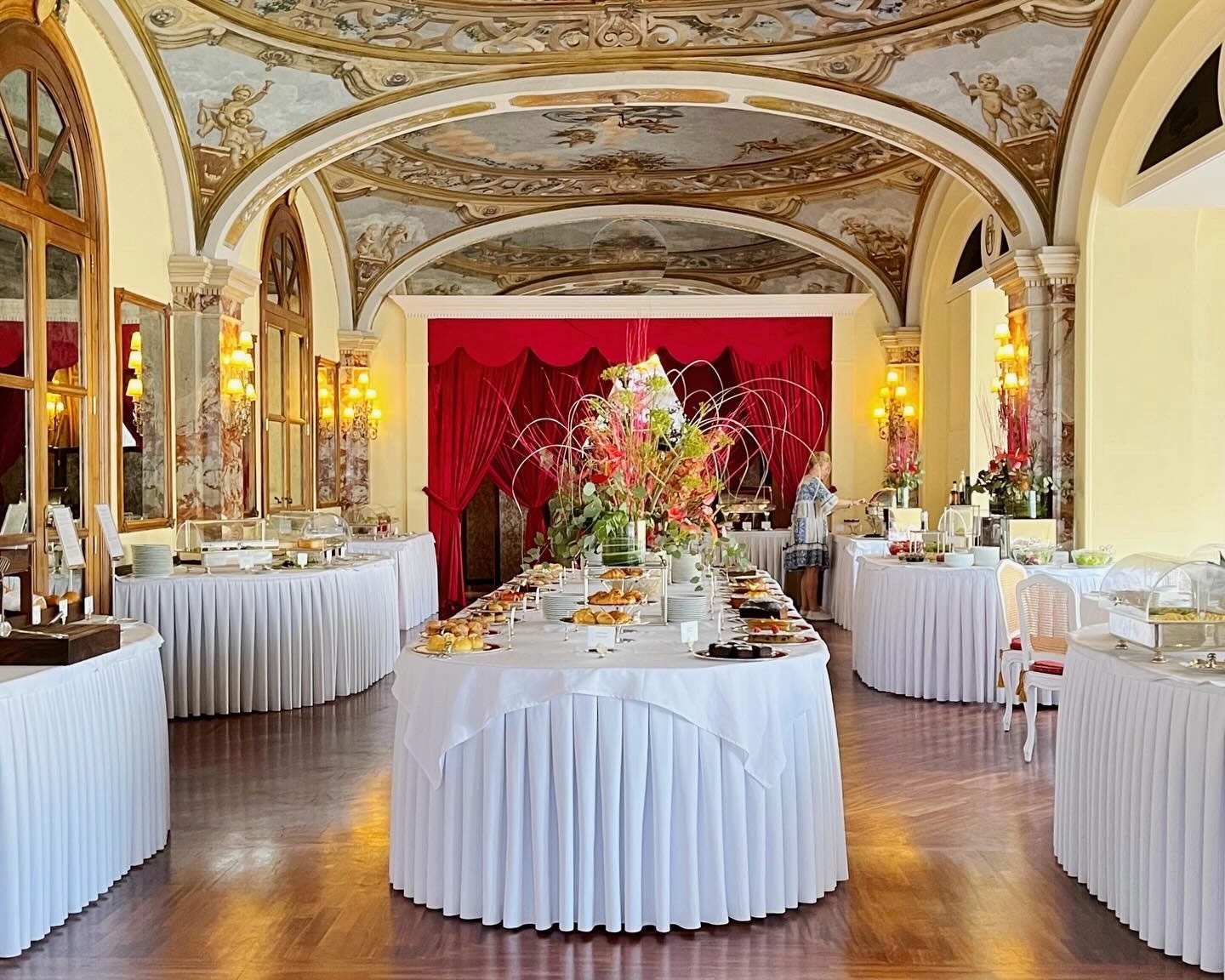
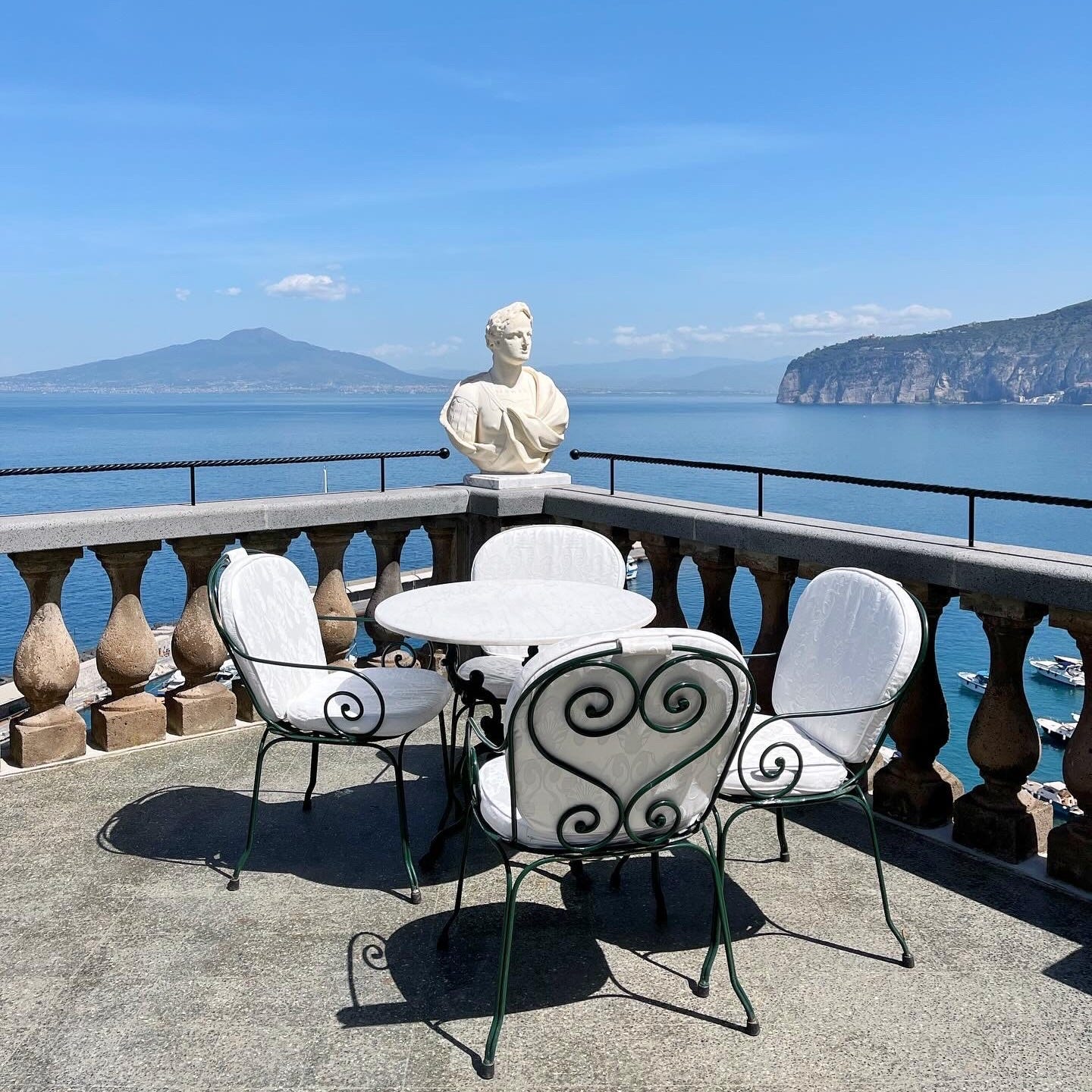
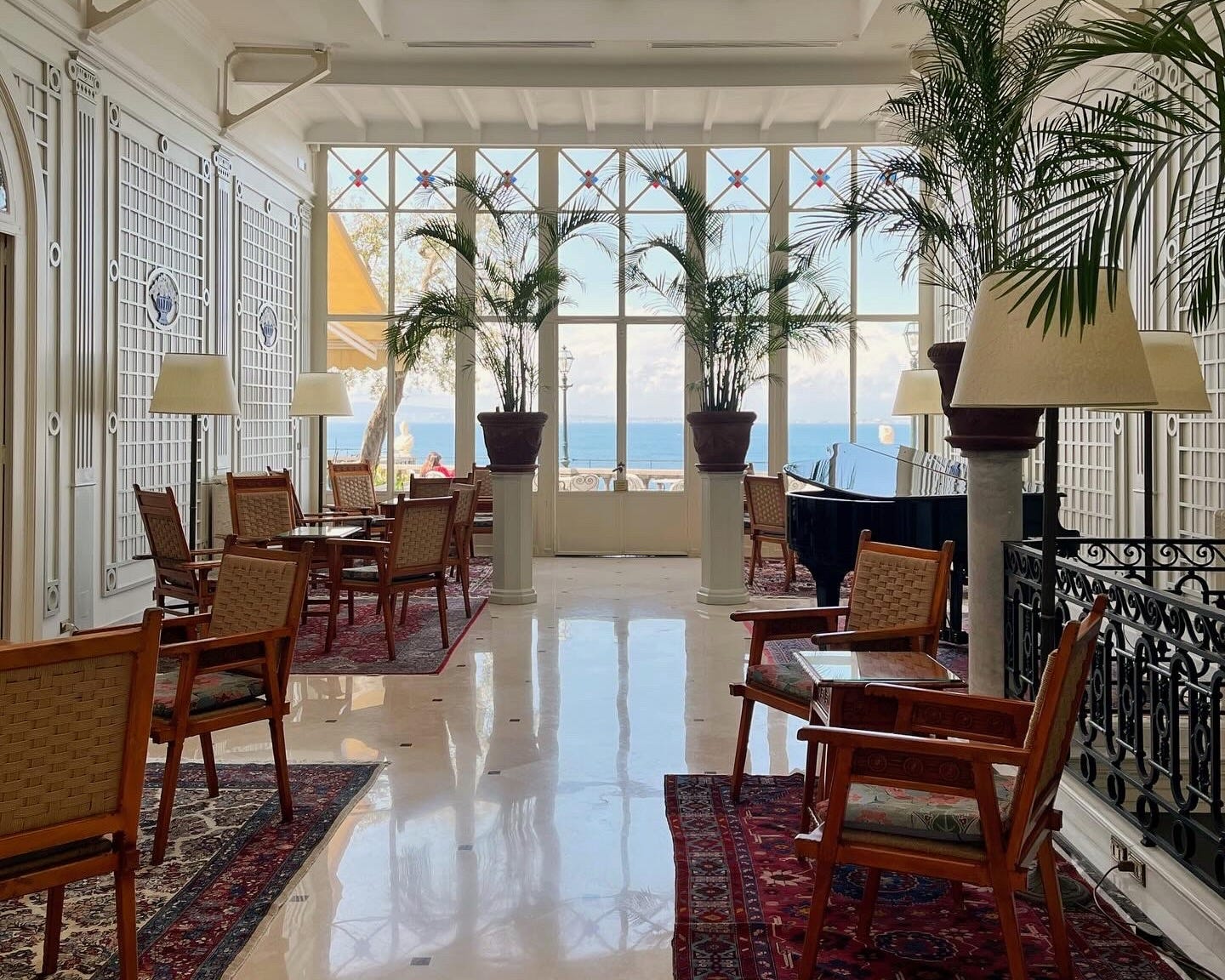
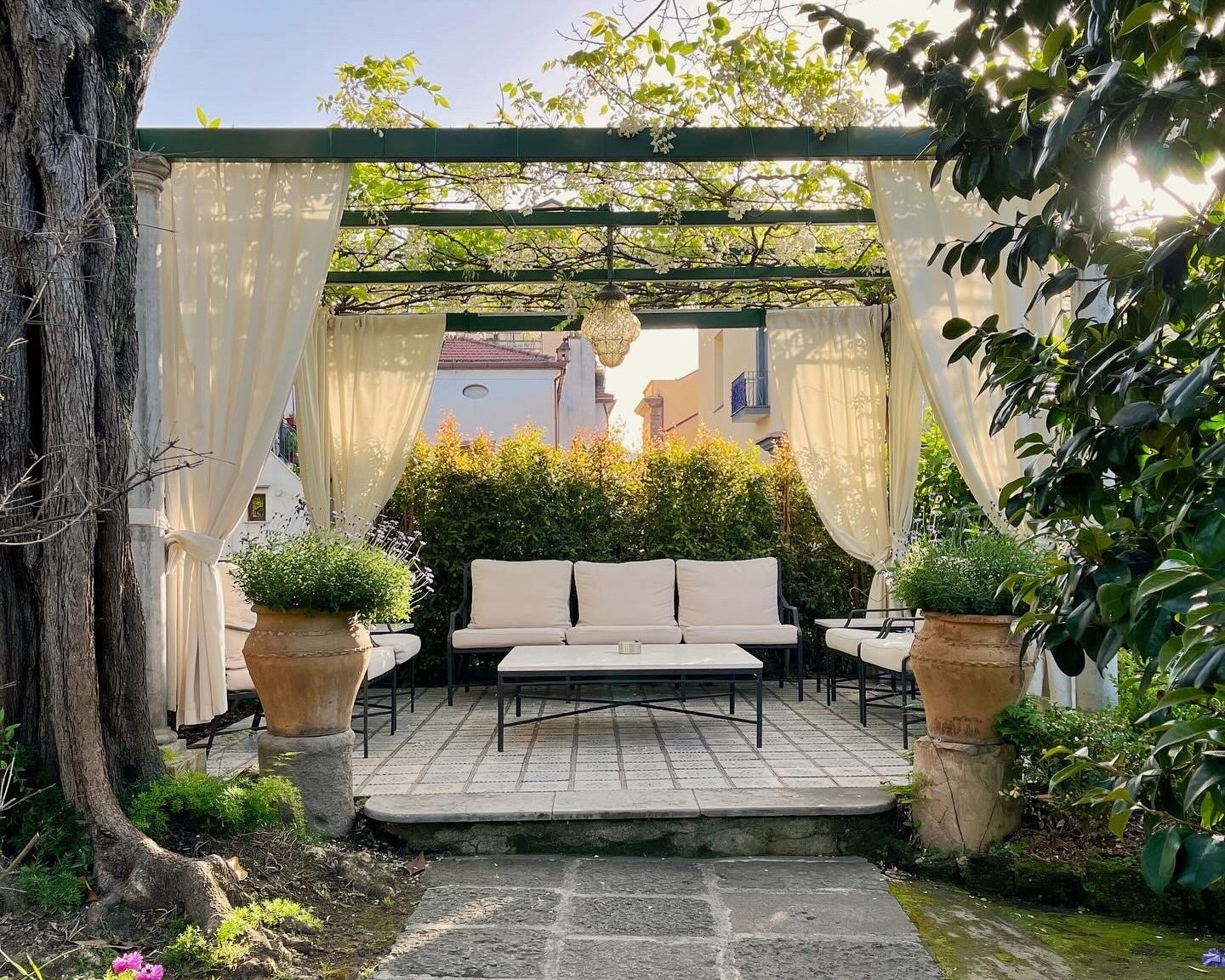
So, so beautiful. I remember my parents stayed there when we met them in Sorrento-- we were staying at remarkably unattractive hotel we'd found through an AmEx travel agent. Entering the Excelsior Vittoria was like falling into a dream. And I love his comment about light switches. Not sure what it is, but Italians love to complicate the light switches. We told our builder: whatever you do, keep it simple. 20 years later, I still switch on every light in the room before I find the one I'm looking for.
He’s the best ✨👏🏻